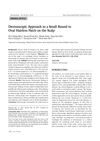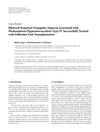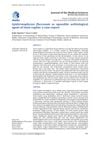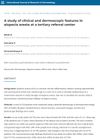 75 citations,
October 1996 in “Dermatologic Clinics”
75 citations,
October 1996 in “Dermatologic Clinics” Chronic Telogen Effluvium is a hair loss condition in middle-aged women that usually doesn't lead to complete baldness.
 3 citations,
December 2011 in “Pediatric Dermatology”
3 citations,
December 2011 in “Pediatric Dermatology” The patient's long-term hair loss was caused by leukemia treatments and low estrogen levels, worsened by her genetic tendency for hair loss.
19 citations,
January 2015 in “Skin appendage disorders” The report found a new type of hair loss in African-American women that affects more areas of the scalp than previously thought.
 41 citations,
January 2014 in “Annals of Dermatology”
41 citations,
January 2014 in “Annals of Dermatology” Dermoscopic examination helps diagnose different types of hair loss conditions by showing specific patterns.
 January 2022 in “Journal of Dermatology and Dermatologic Surgery”
January 2022 in “Journal of Dermatology and Dermatologic Surgery” Trichoscopy is useful for quickly diagnosing different types of hair loss without needing biopsies.
 10 citations,
January 2011 in “Case reports in dermatological medicine”
10 citations,
January 2011 in “Case reports in dermatological medicine” Hair transplant surgery effectively treated a specific type of hair loss and is recommended as a primary treatment option.
 17 citations,
October 2002 in “Dermatologic Surgery”
17 citations,
October 2002 in “Dermatologic Surgery” Successful surgical hair restoration requires careful planning, precise execution, and proper aftercare, using techniques like follicular unit transplantation and correct hair angling for best cosmetic results.
 12 citations,
September 2020 in “Journal of cosmetic dermatology”
12 citations,
September 2020 in “Journal of cosmetic dermatology” Trichoscopy is useful for diagnosing and monitoring alopecia areata treatment.
 20 citations,
January 2009 in “International Journal of Dermatology”
20 citations,
January 2009 in “International Journal of Dermatology” Hair loss in Clouston's syndrome improved with minoxidil and tretinoin treatment.
 3 citations,
April 2021 in “Berkala ilmu kedokteran/Journal of the medical sciences”
3 citations,
April 2021 in “Berkala ilmu kedokteran/Journal of the medical sciences” A fungus called Epidermophyton floccosum can cause scalp infections.
 41 citations,
June 2013 in “PLOS ONE”
41 citations,
June 2013 in “PLOS ONE” Engineered skin substitutes can grow hair but have limitations like missing sebaceous glands and hair not breaking through the skin naturally.
 60 citations,
April 2018 in “Clinical, cosmetic and investigational dermatology”
60 citations,
April 2018 in “Clinical, cosmetic and investigational dermatology” Tight hairstyles and chemical relaxers can cause hair loss known as traction alopecia.
5 citations,
February 2015 in “Ophthalmic plastic and reconstructive surgery” Two new types of eyelid cysts were identified, each with different treatment challenges.
 1 citations,
October 2020 in “International Journal of Research in Dermatology”
1 citations,
October 2020 in “International Journal of Research in Dermatology” The study concluded that short vellus hair and yellow dots were the most common signs of alopecia areata, indicating disease activity and remission.
 83 citations,
May 1999 in “International Journal of Dermatology”
83 citations,
May 1999 in “International Journal of Dermatology” Hair loss that spreads out can often fix itself or be treated by finding and handling the cause.
 31 citations,
April 2010 in “British journal of dermatology/British journal of dermatology, Supplement”
31 citations,
April 2010 in “British journal of dermatology/British journal of dermatology, Supplement” Frontal fibrosing alopecia can cause sudden hair loss on limbs, similar to scalp hair loss.
 July 2020 in “Journal of Cosmetic and Laser Therapy”
July 2020 in “Journal of Cosmetic and Laser Therapy” Using your own platelet-rich plasma (PRP) can effectively treat hair loss, increasing hair density and width with no side effects.
 22 citations,
October 2019 in “Dermatologic Surgery”
22 citations,
October 2019 in “Dermatologic Surgery” Both Platelet-Rich Plasma and Minoxidil foam increase hair count in women with hair loss, but Minoxidil is more effective. However, women were more satisfied with Platelet-Rich Plasma treatment.
 June 1995 in “Archives of Dermatology”
June 1995 in “Archives of Dermatology” A woman's hair loss was due to trichotillomania, which is often misdiagnosed and can require different treatments based on age and underlying conditions.
 July 2018 in “Elsevier eBooks”
July 2018 in “Elsevier eBooks” Stopping tight hairstyles can prevent and reduce traction alopecia.
10 citations,
January 2018 in “International journal of trichology” Eruptive vellus hair cysts are rare and often misdiagnosed, requiring biopsy for accurate diagnosis.
 July 2023 in “International journal of trichology”
July 2023 in “International journal of trichology” The research found no clear link between the severity of male baldness and the scalp examination findings in Indonesian men.
 30 citations,
January 2014 in “Dermatologic Clinics”
30 citations,
January 2014 in “Dermatologic Clinics” Tight hairstyles, especially on chemically treated hair, can cause reversible hair loss if caught early but may become permanent if not addressed.
 August 2024 in “JEADV Clinical Practice”
August 2024 in “JEADV Clinical Practice” Mesotherapy with dutasteride improves hair growth and reduces symptoms in frontal fibrosing alopecia.
 5 citations,
February 2010 in “Facial Plastic Surgery Clinics of North America”
5 citations,
February 2010 in “Facial Plastic Surgery Clinics of North America” The document concludes that understanding hair loss and considering medical treatments like minoxidil and finasteride before surgery is important, especially for young patients with rapid hair loss, and that hairline design varies among different ethnicities.
 58 citations,
September 2012 in “Dermatologic Clinics”
58 citations,
September 2012 in “Dermatologic Clinics” Male pattern hair loss caused by follicular miniaturization; early diagnosis and treatment can reduce psychological burden.
 September 2023 in “Clinical, Cosmetic and Investigational Dermatology”
September 2023 in “Clinical, Cosmetic and Investigational Dermatology” Higher SHBG levels are linked to less severe hair loss in women, but vitamin D levels don't seem to affect hair loss.
 1 citations,
January 2022 in “Skin appendage disorders”
1 citations,
January 2022 in “Skin appendage disorders” Hair shedding after childbirth can reveal a pre-existing condition of hair loss due to tight hairstyles.
 179 citations,
December 2004 in “Journal of The American Academy of Dermatology”
179 citations,
December 2004 in “Journal of The American Academy of Dermatology” Some postmenopausal women with frontal fibrosing alopecia stopped losing hair with finasteride treatment, hinting at a possible hormonal cause.
 2 citations,
December 2019 in “Journal of Dermatological Treatment”
2 citations,
December 2019 in “Journal of Dermatological Treatment” Metabolic syndrome reduces effectiveness of hair loss treatment.



























